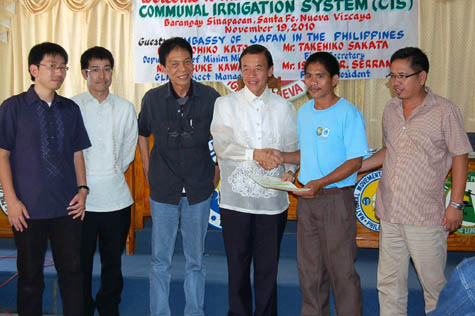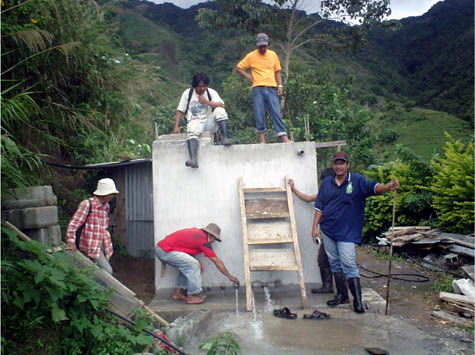
Japanese Embassy Deputy Chief of Mission Motohiko Kato (third from right) formally turns over the Certificate for Communal Irrigation System to Barangay Councilor Eddie Galap (second from right) and witnessed by (from left): GLM Institute Project Manager Ryosuke Kawabe, Japanese Embassy First Secretary Takehiko Sakata, PRRM President Isagani Serrano and Sta. Fe Vice-Mayor Tidong Benito (extreme right). |

Japanese Embassy Deputy Chief of Mission Motohiko Kato led the turn over ceremonies of additional small scale community irrigation systems to selected people's organizations for the Project entitled “Promotion of Participatory Forest Management in the Critical Watershed of Nueva Vizcaya Province”. The event was held in the Municipality of Sta. Fe, Nueva Vizcaya on November 19, 2010. The budget allocation for this project amounting to US$291,262 (approximately PhP 13.6 Million ) came from the “Grant Assistance for Japanese NGO Projects” under Japan's Official Development Assistance (ODA) . Now on its third year of implementation, the project is expanding to include four (4) new barangays from the municipalities of Kayapa, Dupax del Sur, Santa Fe and Kasibu in Nueva Vizcaya. The irrigation systems are expected to benefit over a thousand families in these municipalities.
The implementation of this Project is spearheaded by the GLM Institute, a Japanese NGO, in collaboration with local government agencies in Nueva Vizcaya and PRRM (Philippine Rural Reconstruction Movement) and other local NGOs. This third phase GLMI project aims to develop, extend and expand the efforts of the first and second year activities. The project involves four components, namely: dissemination of sustainable upland agriculture and soil conservation techniques; expansion of water catchments management areas and community irrigation system; marketing exploration, material development for environmental education. The first phase focused on setting up of model farms utilizing sustainable farming methods, strengthening local stakeholder linkages and environmental awareness campaigns. The second phase involved the construction of communal irrigation facilities, trainings for farmers and marketing of agricultural and forest products.
In his speech, Minister Kato emphasized that Japan's ODA has focused on programs and projects that uphold and support sustainable environmental awareness and protection, including forest conservation.
This project reaffirms Japan's commitment to help strengthen the Philippine Government's efforts in the preservation of its forest resources . For more than a decade, Japan, as the top donor of the Official Development Assistance to the Philippines, has assisted the forestry sector in the Philippines through various programs such as the Forestry Sector Project through Japanese ODA loans and Technical Cooperation through JICA, among others. This project also contributes to further strengthening strategic partnership towards the future between Japan and the Philippines.
T he Grant Assistance for Japanese NGO Projects was launched in 2002 to enhance cooperation between the Government of Japan and NGOs in the implementation of ODA to promote effective and efficient aid for developing countries.
Speech of Minister M. Kato
Japanese Version



